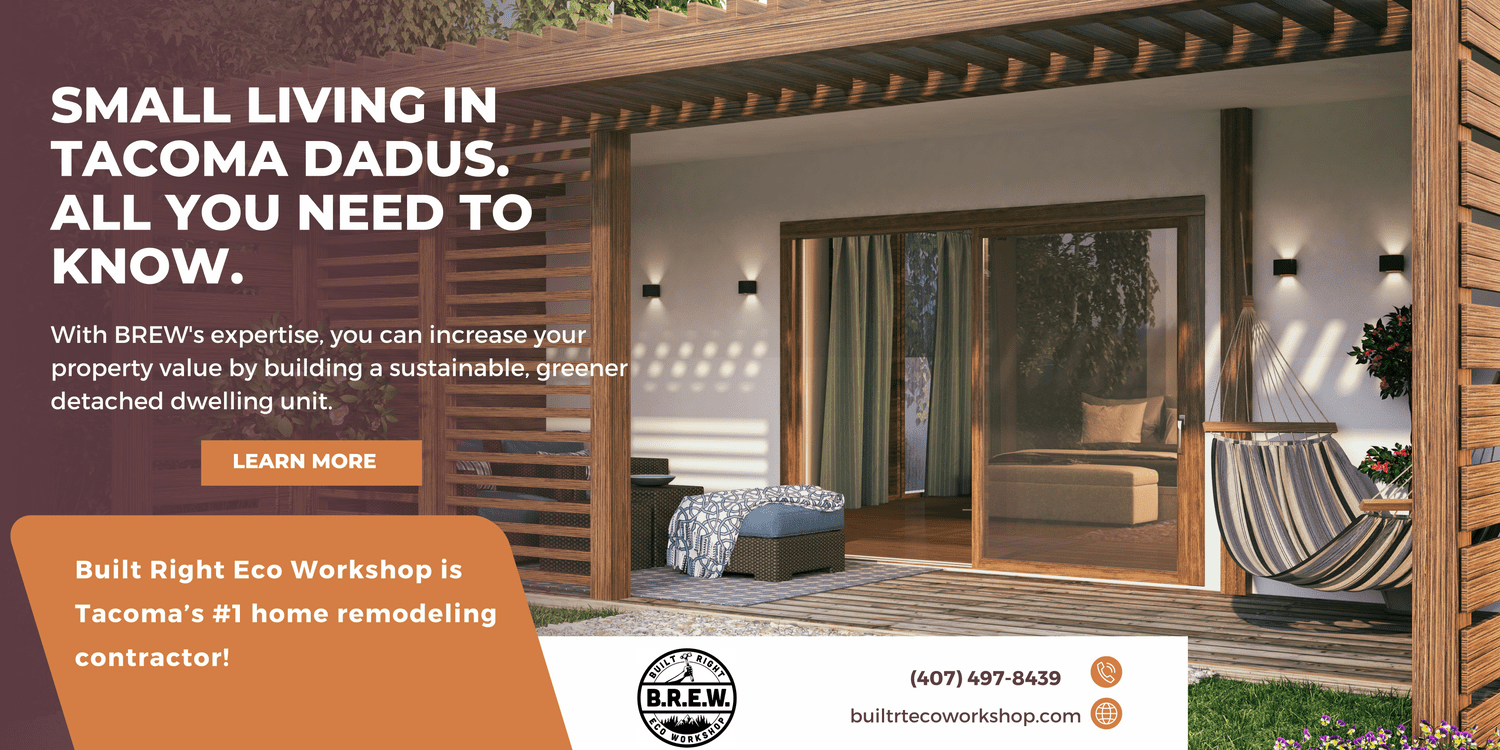
BREW offers affordable rates for their Detached Accessory Dwelling Units, constructed with excellence and quality. With BREW's expertise, you can increase your property value by building a sustainable, greener detached dwelling unit.
Backyard cottages, micro houses, and tiny houses are becoming increasingly popular in King County. Contractors are building them as fast as homeowners are requesting them.
At Built Right Eco-Workshop, we are committed to providing quality DADUs to homeowners to expand their living space and provide more places for people to live. See our DADU service page for more information.
In this blog, we’ve included additional information about DADUs to help you decide if a DADU is right for you. Please call Built Right Eco Workshop if you have any questions; we will explain anything you need to know.
Built Right Eco Workshop is an eco-friendly construction company, and we understand how to build eco-friendly housing.
Quality design, attention to detail, and protecting the environment are some things we consider when planning the construction of your DADU. It’s important that we follow restrictions and codes regarding the construction of DADUs in Tacoma. With these restrictions, we will also consider your situation and any special needs you may have to construct a personalized unit especially suited for you.
The city of Tacoma has ADU regulations and regulations that we are more than willing to explain, guide you through, and find the appropriate applications for your proposed unit. We have extensive experience building ADUs and DADUs that meet city building codes. We will help you understand the laws and regulations of Seattle, WA, and Tacoma, WA.
What Makes A DADU Eco-Friendly?
A DADU, or a Detached Accessory Dwelling Unit, can be eco-friendly in several ways. Here are some of the factors that can make a DADU eco-friendly:
Energy Efficiency: One of the most significant ways to make a DADU eco-friendly is by increasing its energy efficiency. Energy efficiency happens in several ways, including using high-quality insulation, installing energy-efficient windows and doors, and LED lighting. Additionally, incorporating renewable energy sources like solar panels can help reduce DADU’s overall carbon footprint.
Sustainable Materials: Choosing sustainable materials for the construction of the DADU can also make it more eco-friendly. Eco-Friendly materials include using renewable, recycled, or locally sourced materials. For example, using sustainably harvested wood, recycled steel, or low-impact concrete can help reduce the construction process’s environmental impact.
Water Conservation: By incorporating water conservation measures into the design of the DADU, its eco-friendliness increases. One way to do this is by installing low-flow plumbing fixtures and using rainwater harvesting systems; another is by landscaping with drought-tolerant plants.
Waste Reduction: Reducing waste during the construction and operation of the DADU can also make it more eco-friendly, which incorporates waste reduction measures during the construction process, such as recycling or repurposing construction materials. Additionally, utilizing composting or recycling systems within the DADU can reduce the overall amount of waste produced.
Location: The location of the DADU can also impact its eco-friendliness. Choosing a location that is walkable or near public transportation can reduce the need for driving while also supporting local businesses and reducing air pollution.
Passive Design: Incorporating passive strategies that optimize natural light, ventilation, and insulation to reduce heating and cooling loads.
Solar Panels: Installing solar panels to generate renewable energy and reduce dependence on fossil fuels.
A DADU can be designed and constructed by implementing these features to minimize its environmental impact and promote sustainability.
What is the common construction process of a DADU?
Commonly building a DADU (Detached Accessory Dwelling Unit) typically involves the following steps. Of course, there are always exceptions to these.
- Initial Consultation: The contractor will meet with the homeowner to discuss their vision, budget, and any requirements for the DADU. This consultation will help the contractor understand the project’s scope and provide an initial cost estimate.
- Site Assessment: The contractor will assess the site to determine any constraints, such as zoning regulations, building codes, topography, and existing structures.
- Design Phase: The contractor will work with an architect or designer to develop a DADU design that meets the homeowner’s requirements and complies with local regulations. This phase may include obtaining building permits and approval from the local zoning department.
- Pre-Construction Phase: The contractor will finalize the construction schedule and select the necessary materials and equipment for the project. They will also hire any subcontractors and obtain all necessary permits and licenses.
- Construction Phase: The contractor will prepare the site and pour the foundation. They will then construct the walls and roof and install the necessary electrical, plumbing, and HVAC systems. The contractor will also install finishing touches such as flooring, cabinetry, and fixtures.
- Final Inspection: Once the construction is complete, the contractor will schedule a final inspection to ensure the DADU meets all local building codes and regulations.
- Handover: After the final inspection, the contractor will hand over the DADU to the homeowner and provide them with any necessary documentation and warranties.
Throughout the process, BREW will communicate with the homeowner and keep them informed about the project’s progress, any changes in the scope or budget, and any issues that arise.
There are several benefits to building a DADU (Detached Accessory Dwelling Unit):
Additional living space: A DADU provides additional living space on your property, which can be used for various purposes, such as housing family members, renting out to tenants, or as a home office or studio.
Increased property value: Adding a DADU can increase its overall value. A well-designed and constructed DADU can be a great investment and make your property more attractive to potential buyers if you decide to sell in the future.
Rental income: If you choose to rent out your DADU, it can provide a valuable source of rental income that can help offset the cost of building and maintaining the unit.
Multigenerational living: A DADU can be ideal for multigenerational families, allowing for more privacy and independence for family members while still providing a sense of community.
Sustainability: A DADU can be a sustainable option for housing, as it provides an alternative to single-family homes and uses eco-friendly materials and sustainable building practices.
Flexibility: A DADU can be designed to meet your specific needs and adapts over time as your needs change. A DADU functions as a guesthouse, an office, a rental property, or additional living space for family members.
How much does a DADU cost?
Building a DADU can cost $150,000-300,000, depending on the size and location. For example, a 400-750 sq ft unit would cost $130,000 to build, while a 750-1000 sq ft unit would cost $150,000. These are average costs only, as each one is unique. The total cost will also increase significantly depending on what kind of amenities and finishes you want in your detached ADU.
Why Choose Built Right Eco Workshop (BREW) to build your Tacoma DADU?
As an eco-friendly contractor, BREW is committed to minimizing the environmental impact of construction activities. We prioritize sustainable practices, reduce waste, conserve energy, and minimize water usage while using eco-friendly materials and implementing green building strategies. We aim to build energy-efficient, cost-effective, and environmentally responsible structures.
BREW often uses materials and technologies with a lower environmental impact, such as reclaimed wood, bamboo, recycled metal, and low-VOC paints. We incorporate passive design strategies that optimize natural light, ventilation, and insulation to reduce heating and cooling loads.
In addition to our construction practices, BREW considers the environmental impact of my operations. We implement recycling and composting programs on construction sites to divert waste from landfills and reduce the environmental impact.
